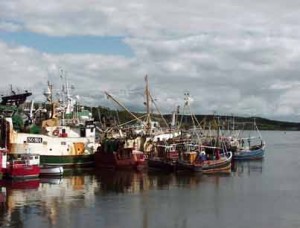

Two of Ostrom’s (1990) institutional design principles emphasize the role of the local –rules must be adapted to local conditions and resource users must participate in the rulemaking process. These principles were determined empirically through cross-site analysis, but a large body of research from science studies supports these finding theoretically as well. The most clear example of including the community in management is through comanagement, which works at the collective level to shift how and where rules are made (Jentoft, McCay et al. 1998). The comanagement process also highlights the importance of different types of knowledge to the policy process by providing a more complete base of information on which to make decisions.
The supporting theory reaches back to early studies in game theory that determined the fairness of a rule was one of the critical factors in determining if cooperation would emerge (Axelrod 1984). Fairness does not necessarily mean that every citizen benefits equally, but instead that people are punished according to their transgressions and benefit according to their contributions. However, the perception of fairness matters more than actual fairness when people evaluate a policy. That perception depends on transparency of the policymaking process. Gusterson goes so far as to say “instead of seeking a definitive technical judgment, then, we should ask about the processes by which judgments come to be considered definitive and their authors authoritative” (Nader 1996). People are more likely to consider a policy fair if they consider the process fair. One way, arguably the best way, to make the process transparent and therefore fair is to involve citizens in that process.
A transparent, participatory process aids in legitimization of the policy, which in turn makes citizens more likely to abide by the policy. Participation in the policy extends all the way into the knowledge generated in order to inform the policy. In fisheries research, for example, it is widely recognized that fisher participation in fisheries research gains legitimacy in later policy formation (Silver and Campbell 2005). Citizens rely on procedural, not substantive, schemas (or ways of knowing), so legitimization must come through process, not final product (Fischer 2002). Participatory policies are therefore legitimized through greater understanding of the policy and the motivations behind it, but also if citizens are part of the policymaking process, they cannot have a conflict with the policy on the basis of exclusion since they were present during its formation.

Participation has additional benefits beyond transparency and greater understanding. The process of participating in either knowledge formation or policy formulation lends authority to the participants. In an extreme example, Gusterson describes how participating in nuclear testing made someone a nuclear authority and able to give advice to policymakers (Nader 1996). He titled his chapter “Nuclear Weapons Testing: Scientific Experimenting as Political Ritual”, exemplifying how the testing was more about the authorization than about the scientific results. Since the weapons were likely never going to be used, Gusterson posits that the testing may have been a means to create political experts rather than train weapons technicians. More subtle examples of this process occurs in other questions of science policy, supporting the claim that participating in knowledge formation or policy formulation lends authority to more types of expertise and encourages future engagement.
Citizens who participate in the policymaking process also then serve as liaisons between career policymakers and the rest of the community. In this position, they can present the policy and translate it to fit in with local culture and values. For example, fishers in Ireland reported local management schemes as “natural” even though they later went on to explain that they had participated in the rulemaking process – they had consciously hybridized the new regulations with local traditions to ensure other fishers cooperated (McCay and Acheson 1987).
Berkes (2008) thinks of “traditional ecological knowledge as a way of life and an abundance of references to ways of knowing and doing things, knowledge as process – as opposed to knowledge as content”(pg. 4), again highlighting the importance of fitting new knowledge (and therefore policies) into the local ways of knowing.

As the case of the Irish fishermen exemplifies, participants also take ownership of policies they have helped create. This ownership manifests itself in further aid in embedding it into community habits and enforcement. In the case of natural resources, this feeling of ownership is extended to the resource, increasing the likelihood of future protection of the resource (Jasanoff 2004). In addition, Bakker (2010) points out that a shift in governance must be accompanied by a shift in business practices often outside the jurisdiction of the policy, so this sense of ownership and responsibility is an important link to move the whole system toward sustainability, not just the policy. Other links follow from a feeling of ownership, including increasing the knowledge base around the problem: “local knowledge development is most vibrant when local people are able to make their own management decisions” (Berkes 2008 p.223). Ownership of the policy and the problem lead to complementary developments in addition to the policy.
Emphasizing the role of the local citizens also tends to decentralize power, shifting some to the community or local level. Two processes are at work here: the shift from government to governance as power shifts from state to nonstate actors and decentralization of power. These shifts are “emblematic of the sustainable development challenge: rescaling and reforming governance so as to minimize conflicts and maximize synergies between social, environmental, and economic goals” (Bakker 2010). The subsidiary principle states that there are advantages to decentralized governance. Jentoft (2007) depicts the resultant governance as a rose with multi-level policy formation and constant legitimization. This decentralized governance structure can better match the diversity, complexity, dynamism, and vulnerability of a given community than higher level policies (Jentoft 2007).
The addition of complexity to policy analysis and the realization that process is as important, if not more, as the final product, meant that policy analysts had to interact with community members more. Initial interactions based on these two facts produced evidence that participation had a variety of other benefits. The addition of methods to policy analysis from other fields that enabled analysis of additional community and environmental variables (a la the IAD framework) facilitated the recognition of the linkages that connected these variables to successful management. Moving beyond analysis to thinking of policy as experimental, scholars have been able to track the direct effects of certain policymaking process on the outcome of the policy and participation is key.
References:
Ostrom, E. (1990). Governing the commons: The evolution of institutions for collective action, Cambridge Univ Pr.
Jentoft, S. (1998). Social theory and fisheries co-management Marine Policy, 22 (4-5), 423-436 DOI: 10.1016/S0308-597X(97)00040-7
Axelrod, R. (1984). “The Evolution of Cooperation. New York.” Basic Books. Rusbult & Buunk: Interdependence and commitment 201: 32-40.
Nader, L. (1996). Naked science: anthropological inquiry into boundaries, power, and knowledge, Routledge.
SILVER, J., & CAMPBELL, L. (2005). Fisher participation in research: Dilemmas with the use of fisher knowledge Ocean & Coastal Management, 48 (9-10), 721-741 DOI: 10.1016/j.ocecoaman.2005.06.003
McCay, B. and J. Acheson (1987). The question of the commons: the culture and ecology of communal resources, University of Arizona Press, Tucson.
Berkes, F. (2008). Sacred ecology, Psychology Press.
Jasanoff, S. (2004). States of knowledge: the co-production of science and social order, Routledge.
Furlong, K., & Bakker, K. (2010). The contradictions in ‘alternative’ service delivery: governance, business models, and sustainability in municipal water supply Environment and Planning C: Government and Policy, 28 (2), 349-368 DOI: 10.1068/c09122
Jentoft, S. (2007). Limits of governability: Institutional implications for fisheries and coastal governance☆ Marine Policy, 31 (4), 360-370 DOI: 10.1016/j.marpol.2006.11.003
Thanks for sharing this. Spot on. You might enjoy this related paper and call for action we launched about this time last year at the Woodrow Wilson Center for Scholars.
http://www.wilsoncenter.org/index.cfm?topic_id=1414&fuseaction=topics.documents&group_id=271875
Good article. It seems to me that citizen involvement and participation are a necessary and required part of any mangagement plan particularly when it concerns a public resource. The trick is getting the public to be less apathetic and more involved. I’ve been noticing an increase in public involvement in several issues I’ve been paying attention to myself. One thing I’d like to see more of are citizen science programs in whatever programs can allow for it. There are lots of people that take an interest in and what to contribute to pretty much everything out there. It’s been one of the ways I’ve been able to build on the outreach program I operate in San Francisco.
Greg Barron